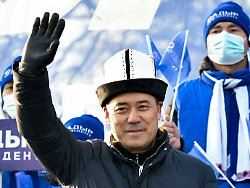Sunday 10th January 2021
After bloody protests
Ex-prisoner becomes president of Kyrgyzstan
In the midst of mass protests, angry Kyrgyz storm the government building and free opposition members from prison. Also Sadyr Shaporov, who is imprisoned for taking hostages. A few months later he is elected President.
Three months after the violent change of power in the high mountain region of Kyrgyzstan in Central Asia, Sadyr Shaparov becomes the country's new president. He won the early vote on Sunday after counting almost all ballot papers with 79 percent of the vote, as the Kyrgyz media reported. According to the Central Election Commission in the capital, Bishkek, the turnout was 38 percent.
After the unrest in autumn, Shaparov had temporarily taken over the business of the president and the head of government within a short period of time. The 52-year-old forced President Sooronbay Dscheenbekow to resign in mid-October. The trigger was the parliamentary election overshadowed by allegations of fraud. After that, bloody mass protests broke out in the ex-Soviet republic on the border with China. Angry Kyrgyz people stormed government buildings and freed opposition members from prison, including Shaparov. He had been convicted of hostage-taking in the past.
17 candidates ran for the presidential election. Shaparov's closest challenger was the head of the Butun party, Adachan Madumarov, who, according to the results, got six percent of the vote. He announced that he would not recognize the election result. The voters also voted in a referendum on constitutional reform. Despite a low voter turnout of 34 percent, it was accepted by the authorities as valid. Accordingly, 81 percent of voters voted for more powers for the new president. The voters decided to reintroduce the presidential system that was abolished more than ten years ago.
In 2010, after the overthrow of the authoritarian President Kurmanbek Bakiyev, the country experienced a phase of democratization that was unprecedented for Central Asia. The powers of the president had been restricted in favor of the development towards a parliamentary republic based on the western model. The fact that the reform was initiated before the parliamentary elections was widely criticized. The vote at the beginning of October was canceled after the riots. It should be made up for by the summer. According to the Interior Ministry, more than 11,000 police officers were supposed to prevent new riots this time.
.
